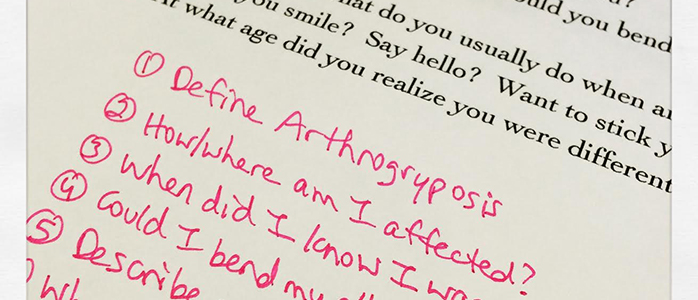Well, friends, I thought I’d finish up the Q&A series today, but there are more questions to answer. Here is Part Three.
What sort of movement have you lost or gained since you were a child, and what development/changes were the most difficult for you?
I wish I could say I’ve gained movement. In some ways I have if you compare the me-now to the me-at-birth. But things started to change in my early-mid twenties. My body didn’t quite feel the same and my muscles seemed to grow tired faster. Maybe this was a normal part of getting older. Maybe it had to do with “graduating” from physical therapy after high school. I wasn’t doing the same strenuous exercises every week. But my therapist checked me after a few months and didn’t notice any changes. She said my body and muscles were stable since I had stopped growing. So that was good news and I learned to adjust and accept the facts: I was no longer as free to move around the house. I needed help to move from room to room. I needed that person walking beside me, holding my arm and offering physical support and emotional comfort.
None of this happened overnight. It took years for me to be okay with my muscles not working or feeling the same. I couldn’t talk about it for a while because I wanted to deny the reality. I didn’t like the idea of losing this piece of my independence. I remembered my childhood so well and all the years leading up to adulthood. I used to walk without help. I didn’t need a companion unless I was leaving the house. Then I would want help to walk on any uneven ground. I could run to my room if I wanted to get away from my brothers or make my way to the kitchen for dinner time. Of course, with this freedom came the risk of falling. And that was always a big fear. I had plenty of falls as a child. They were scary every time. The injuries were never too terrible.
But as an adult, I’m taller now and higher off the ground. I am more afraid of falling these days because I imagine it would hurt more. It can still be hard to realize my legs are not as strong or confident as they once were.
And maybe I can do something about it nowadays. Maybe my legs can and will grow stronger again. Our bodies are constantly changing with time. So I will get back to you on this…
How does Arthrogryposis affect your fingers?
I have long, skinny fingers to match my very long and skinny arms. Thankfully I can use my hands in a lot of ways. There is not a ton of strength in my fingers, but all the physical therapy helped straighten them out. Yes, exercising my fingers was a part of therapy for many years. I’ll even tell you we used to take my shoes and leg braces off to stretch my toes. Those muscles were tight, too, and I have one toe that is completely bent underneath my foot. My therapist would try to pull it straight as she put my braces back on, but I remember sneaking in one last wiggle to free my toe. It wanted to bend and it has never hurt or bothered me. That was a side story…
I am right-handed so those fingers are definitely stronger. With this hand, I write, I type, I carry small things, I drive my wheelchair, I offer it when shaking someone else’s hand, and a number of other things. My dad used to joke that I didn’t like my left hand. Then we would have these funny conversations where I’d say, “I do like my left hand…it can do this or help me with that…” I played right along. The trouble is my left hand is a lot weaker. And my left arm has always been a little twisted to the side. Physical therapy helped, but it couldn’t fully change it.
Over the years, I figured out each hand has its own purpose. This is neither good nor bad. When I use both hands together, my fingers can do that much more.
What do you usually do when an adult stares at you and just can’t seem to stop? Do you smile? Say hello? Want to stick your tongue out at them?
Depends on my mood. Sometimes I look and smile. I might decide to speak. If I’m feeling frustrated, I’ll ignore them and keep going. Most of the time the staring happens when I’m out in public. There is no time to start a real conversation with this stranger who knows nothing of me, except what they see.
I can wonder all day what they are thinking or if they’ve never seen a person in a wheelchair.
I think I’m being kind when I offer no reply and in some cases this is the best way I can respond. I might feel hurt or frustrated or misunderstood and the words that come to mind may not be loving. As soon as I leave, I can find myself venting those feelings and frustrations.
And I realize and wonder for the next time…is there a right way to say, “I know I look different on the outside, but I have a brain that works like normal, a mouth that opens too quickly at times and not fast enough other times, and we are far more similar than you might imagine. Let’s be friends. I’ll show you my world if you let me enter yours.“?
Catch up on Parts One and Two if you missed them. And look for Part Four next week!

